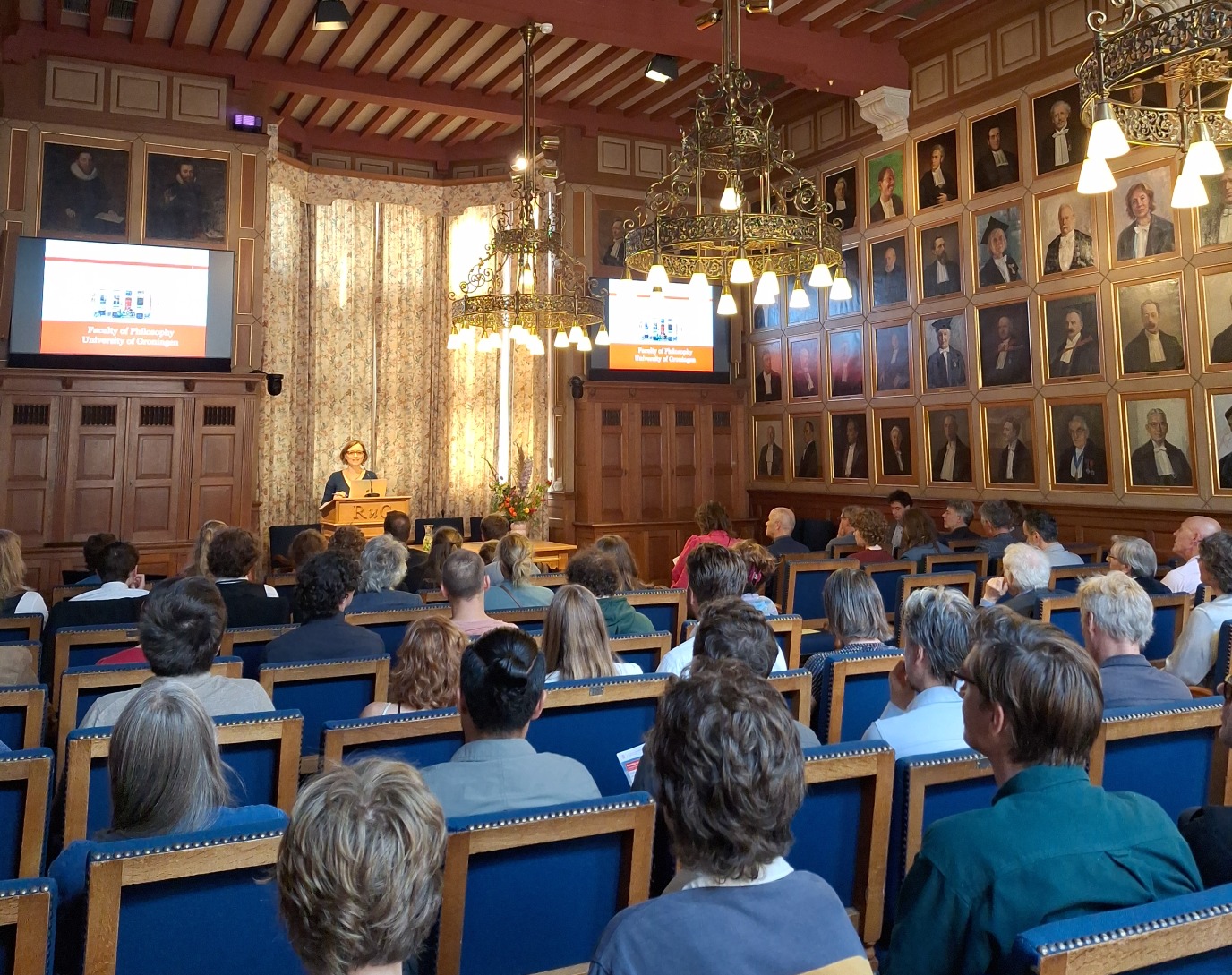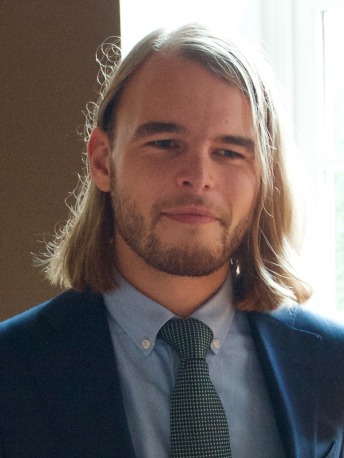Alumni
Improve your professional network
Stay in touch with your former lecturers and fellow students, share ideas, knowledge, job opportunities, and keep each other informed about philosophical activities through our private LinkedIn Alumni Community Faculty of Philosophy.
The faculty board also publishes an annual newsletter for its alumni. The most recent edition is that of spring 2025.
Keep your knowledge up to date
As a member of our group you can attend workshops and events held at the faculty for free. Please find upcoming workshops and colloquia on the faculty calendar. There are also various Winter and Summer schools on offer.

Faculty of Philosophy - 60 years
Philosophy is more fun when you think about it!
This year, the faculty celebrated its 60th anniversary, and we enthusiastically marked this milestone with a series of special events. More information about the lustrum festivities can be found on the lustrum page.
Testimonials
Although you come across philosophers everywhere in society, a recurring question from our students, and their parents, is: what jobs are there for philosophers? Of course, our alumni are the ones best fit to answer this question. By sharing your knowledge about this, you will not only be of enormous help to our students, you’ll also gain contacts you might profit from later on. You can email us at alumni-wijsbegeerte rug.nl
Find a number of testimonials from philosophy alumni below.
Miranda Lahuis - Webmaster at the municipality of Veendam

I studied at the Faculty of Philosophy from 2013 through 2019. First I finished the Bachelor's program and then I followed the one-year Master's of Philosophy and Society. The Bachelor's program was a broad course about the history of philosophy and all types of fields with kind and enthousiastic teachers. Despite the program's breadth (e.g. history, ethics, logic, science and social- and political philosophy), we were also taught about these areas in depth.
The lectures and seminars were interesting and many people always attended, sometimes even from other programs. As philosophy students, we could even learn from them.
The key skills I learned are mainly critical thinking, clear writing and argumentation, analysing complex cases and studying reality in your own way by thinking transcendantly.
During the Master's program, which focuses on contributing to the public debate as a philosopher, everything came together nicely in an internship as editor at Stichting Noorderbreedte. Here, I was able to write pieces for the magazine and interview people. This way, I was able to make my contribution to certain societal questions.
At my current job as webmaster for a municipality I am able to use my learned skills very well. Teacing my colleagues about the importance of certain laws and requirements for website is easier thanks to this foundation. Additionally, with the Bachelor's and Master's, I also learned to structure my own thinking. This way, I can analyse whatever I face well, a skill that can be applied anywhere.
Jesse Tangerman - Policy officer at the municipality of Groningen

In 2019, I started my Bachelor's at the Faculty of Philosophy and in 2022 I started the Master's Philosophy and Society, which I believe is now part of the regular Master's program. I obtained my degree in August 2023 . In September 2024, I started as a policy officer at the municipality of Groningen.
During my program, I already knew that I wanted to end up in a public function. This influenced my choice of Master's. Philosophy and Society required a long-term internship, which seemed useful for finding work in the future to me. This way, I had something to point to, besides side jobs, as (semi-)professional experience.
It's difficult to link specific philosiphical areas to my work, as I encounter bits of everything, just in significantly less rigid ways than in the academic world. The municipality operates at the edge of practice and theory. Because of this, I am often weighing different needs; the ideals of politics and the practice of implementation. I've noticed that my philosophical background especially helps here. As we are supposed to convey public responsibility, internal consistency is very important and I strongly believe that a philosophical view helps with this. Breaking open problems and testing all separate elements to what we've said about them before, for one. Philosophy has also helped me think abstractly. It cannot always be applied, but it helps to keep the bigger picture within view.
Regardless, there are a bunch of concrete philosophical questions that I find myself thinking about daily. Resident participation in a representative democratic system, the nodes and rights of special housing, and the municipality's obligations towards nature, to name a few.
Ymko Braaksma - Researcher and Project Leader Planbureau Fryslân

At the Faculty of Philosophy, I consecutively earned my Bahcelor's Philosophy of a Specific Discipline (2013-2014) and the Research Master (2014-2016), and finished a promotion process (2016-2022). I specialized in the areas of history, philosophy, and philosophy of history.
One of the questions that occupied my mind throughout this entire period was: 'Is it possible to learn from the past and, if so, how?' The knowledge that I gained as a result is very useful in my current work for Planbureau Fryslân. There, I help government organizations to learn from the execution of their own policies. Additionally, I am responsible for the continuous development of the method of the learning policy evaluation at the planning bureau. For this, I use the works of philosophers such as John Dewey (1859-1952), R.G. Collingwood (1889-1943) and Frank Ankersmit (1945- ).
As well as that, I developed a number of skills that I can apply almost daily during my studies. Obvious ones include critical thinking, precise reading and analysing of texts, and being able to put myself in someone else's shoes.
Most useful, however, is probably being able to think about the bigger picture. The philosophers I studied during my courses were often systematic thinkers: they focused on the entire spectrum of philosophy, from metaphysics to ethics and political philosophy, and they saw these fields as one. To be able to understand these philosophers, I had to think in similar ways.
This is a skill that is also very useful at Planbureau Fryslân. In government policy, areas oftentimes come together - economics, physical space, and social environments - all of which affect one another. Moreover, different actors, from citizens to entrepreneurs and governments, evolve activities that relate to the domains and to one another. My philosophy degree helps me to be able to see through the chaos.
Job de Grefte - Assistant Professor Business Ethics and Sustainability

With great expectations, I arrived at the Faculty of Philosophy in 2007. I had taken the propaedeutic year of the study Business Administration at the Faculty of Economics and Business and was looking very much forward to some more abstract material. I was not disappointed. The faculty of philosophy is a small and friendly place of high-quality thinking. I remember fondly the general introduction course that gave students a ‘taster’ of many subjects later to be developed in the programme. Overall, the Philosophy BA programme offered a comprehensive and well-rounded introduction to the main fields and styles of philosophy, laying a solid foundation for my eventual specialization during my Master’s studies.
It was fun too; it made me enthusiastic enough to apply for the Research Master (at the same Faculty of Philosophy), and focus only on philosophy after I completed my degrees in Philosophy and Business Administration. The RM programme was even more fun, as it allowed for close contact with and supervision by staff, and encouraged a term abroad (in my case, St. Andrews). It prepared me well for an academic career, culminating in a thesis a version of which would ultimately be published in a good journal.
After the RM, I continued at the faculty as a PhD candidate. Here, the support and contact with staff intensified even more, and the line between being a student and being a staff member blurred considerably. I was given opportunities to teach and help with manuscript and grant preparation. These experiences were crucial for my career trajectory: first as a lecturer at the Faculty of Philosophy, and now as an assistant professor at the Faculty of Economics and Business.
Tell us about your experiences
We would very much like to know about your experiences on the job market. How well do you feel the programme you followed with us prepared you for your job? Did you acquire adequate skills during your studies and is your knowledge sufficient and do you have points of improvement for the curriculum?
You are very much welcome to share your experiences as a speaker during an alumni event or during the annual Career Day for faculty students. Please reach out to the career officer of the Faculty of Philosophy.
Ask a philosopher: let us do research for your employer
Our Knowledge Centre Philosophy (KCF) connects professional philosophers to companies and organizations with a philosophical research question in various ways, helping put philosophy into practice. For example, we can do this through interviews or research, or by giving workshops. Does your employer have a research question? Contact Marc Pauly or Yorick Karseboom from the Philosophy Knowledge Centre.
